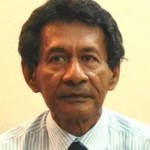International Adjudicators – Why Not ?

By ANI Ekanayaka –July 30, 2016
There seems to be much unnecessary anxiety, muddled thinking and something fundamentally irrational about the prevailing revulsion in various quarters to foreign participation in any independent inquiry into allegations ofwar crimes in Sri Lanka. We must remember that at the 32nd sessions of the UNHRC last month its Commissioner Zeid Ra’ad Al Hussain seemed adamant about the need for such participation stating “I remain convinced that international participation in the accountability mechanisms, as stipulated in the Human Rights Council’s resolution, would be a necessary guarantee for the credibility, independence and impartiality of the process in the eyes of victims given the magnitude and complexity of the alleged international crimes, which the OHCHR investigation found could amount to war crimes and crimes against humanity”.
The OHCHR investigation to which the Commissioner referred was the 261 page report that was presented at the 30th sessions of the Commission which stated inter alia that “The patterns of commission of gross human rights violations and serious violations of international humanitarian law, the indications of their systematic nature, combined with the widespread character of the attacks all point to the possible perpetration of international crimes” (1267). The report also said that “for an accountability mechanism to succeed in Sri Lanka, it will require more than a domestic mechanism”(1278).
Accordingly in any dispassionate analysis of this issue the place to start is the joint resolution which Sri Lanka actively co-sponsored at the 30th sessions of the UNHRC in response to the OHCHR findings. The resolution agreed “to establish a Judicial Mechanism with a Special Counsel to investigate allegations of violations and abuses of human rights and violations of international humanitarian law, as applicable”. This joint resolution carried with it the inescapable implication that Sri Lanka was in agreement with the international community that the allegations did indeed merit inquiry. Therefore the bottom line is that Sri Lanka has concurred with the need for an independent inquiry into allegations of war crimes. It has effectively admitted that there is a case to answer.
That is the definitive Sri Lankan position and having conceded that an inquiry was justified it is logically committed to an investigation that will reveal “the truth the whole truth and nothing but the truth”. Indeed as a general principle for anybody to agree to an inquiry about any kind of allegation while backing away from the kind of inquiry that will reveal the truth, would be a contradiction that is both disingenuous and immoral. Obviously Sri Lanka would not wish to court an international reputation for such duplicity. Accordingly by the inexorable logic of the situation where Sri Lanka has agreed to an inquiry, it is now bound to set up a mechanism of inquiry where the probability of discovering the truth will be maximised, where the nature of the tribunal and its composition would make it more rather than less likely that the truth will be revealed. It would be foolish and presumptuous to speculate on what that truth might be. Whether the allegations are baseless or have some substance is not our concern here. But there is no question that any genuine inquiry must give primacy to finding out.
This logically leads to the next question, namely whether the inclusion of a minority of distinguished foreign adjudicators in such a panel would or would not increase the chances of finding out the truth. One thing is clear. It certainly would not diminish the chances of finding out the truth. Indeed it cannot. There is no doubt that the inclusion of say two or three eminent and highly respected judges from abroad in a tribunal where Sri Lankan adjudicators were in a majority would if at all help rather than hinder the process of seeking out the truth. The emotive suggestion that they might be influenced by a biased Tamil diaspora is tendentious because in that case it could be equally alleged that the majority Sinhala judges might be influenced by local Sinhala Buddhist sentiment. Indeed by no stretch of imagination can it be argued that the inclusion of foreign judges would be inimical to the process of truth seeking in such an investigation. That is if the focus is on seeking the plain truth and not some other nationalist agenda. Accordingly approached negatively it has to be concluded that the inclusion of foreign judges can do no harm. Approached positively it might conceivably do some good for two reasons.
